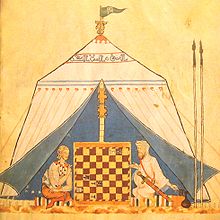
Back More Afrikaans Mauren ALS موريون Arabic مور ARY مور ARZ Moru AST Mavrlar Azerbaijani Маврҙар Bashkir Маўры Byelorussian Маўры BE-X-OLD

The term Moor is an exonym first used by Christian Europeans to designate the Muslim populations of the Maghreb, al-Andalus (Iberian Peninsula), Sicily and Malta during the Middle Ages.[1] Moors are not a single, distinct or self-defined people.[2] The 1911 Encyclopædia Britannica observed that the term had "no real ethnological value."[3] Europeans of the Middle Ages and the early modern period variously applied the name to Arabs, Berbers, and Muslim Europeans.[4]
The term has also been used in Europe in a broader sense to refer to Muslims in general,[5] especially those of Arab or Berber descent, whether living in al-Andalus or North Africa.[6] During the colonial era, the Portuguese introduced the names "Ceylon Moors" and "Indian Moors" in South Asia and Sri Lanka, now official ethnic designations on the island nation, and the Bengali Muslims were also called Moors.[7] In the Philippines, the longstanding Muslim community, which predates the arrival of the Spanish, now self-identifies as the "Moro people", an exonym introduced by Spanish colonizers due to their Muslim faith.
In 711, troops mostly formed by Moors from northern Africa led the Umayyad conquest of Hispania. The Iberian Peninsula then came to be known in Classical Arabic as al-Andalus, which at its peak included most of Septimania and modern-day Spain and Portugal. In 827, the Aghlabid Moors occupied Mazara on Sicily, developing it as a port.[8] They eventually went on to consolidate the rest of the island. Differences in religion and culture led to a centuries-long conflict with the Christian kingdoms of Europe, which tried to reclaim control of Muslim areas; this conflict was referred to as the Reconquista. In 1224, the Muslims were expelled from Sicily to the settlement of Lucera, which was destroyed by European Christians in 1300. The fall of Granada in 1492 marked the end of Muslim rule in Spain, although a Muslim minority persisted until their expulsion in 1609.[9]
- ^ Corfis, Ivy (January 2010), "The Moors?", The Moors: Al-Andalus, Sepharad and Medieval Iberia, BRILL, pp. 151–162, ISBN 9789047441540 – via Brill.com
- ^ Ross Brann, "The Moors?", Andalusia, New York University. Quote: "Andalusi Arabic sources, as opposed to later Mudéjar and Morisco sources in Aljamiado and medieval Spanish texts, neither refer to individuals as Moors nor recognize any such group, community or culture."
- ^ Chisholm, Hugh, ed. (1911). . Encyclopædia Britannica. Vol. 18 (11th ed.). Cambridge University Press. p. 812.
- ^ Blackmore, Josiah (2009). Moorings: Portuguese Expansion and the Writing of Africa. U of Minnesota Press. p. xvi, 18. ISBN 978-0-8166-4832-0.
- ^ Menocal, María Rosa (2002). Ornament of the World: How Muslims, Jews and Christians Created a Culture of Tolerance in Medieval Spain. Little, Brown, & Co. ISBN 0-316-16871-8, p. 241
- ^ John Randall Baker (1974). Race. Oxford University Press. p. 226. ISBN 9780192129543. Retrieved March 12, 2014.
In one sense the word 'Moor' means Mohammedan Berbers and Arabs of North-western Africa, with some Syrians, who conquered most of Spain in the 8th century and dominated the country for hundreds of years.
- ^ Pieris, P.E. Ceylon and the Hollanders 1658–1796. American Ceylon Mission Press, Tellippalai Ceylon 1918
- ^ "Assessment of the status, development and diversification of fisheries-dependent communities: Mazara del Vallo Case study report" (PDF). European Commission. 2010. p. 2. Retrieved 28 September 2012.
In the year 827, Mazara was occupied by the Arabs, who made the city an important commercial harbour. That period was probably the most prosperous in the history of Mazara.
- ^ Hillgarth, J. N. (2000). The Mirror of Spain, 1500–1700: The Formation of a Myth. University of Michigan Press. p. 67. ISBN 0-472-11092-6.